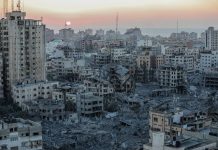DM Monitoring
WASHINGTON: Iran has agreed to United Nations (UN) inspection of a couple of its nuclear sites. But this is unlikely to help ease the crippling U.S. sanctions on the Islamic republic, experts said.
“A new deal on inspections probably won’t by itself help a lot, even if it’s potentially a welcome small step,” Michael O’Hanlon, a senior fellow at Brookings Institution, told Xinhua about the question of U.S. sanctions relief for Iran.
Iran on Wednesday agreed to permit inspectors to access two of its nuclear sites, in a deal inked during a visit to Iran by UN watchdog International Atomic Energy Agency (IAEA) Director General Rafael Grossi.
“I think better inspections help,” O’Hanlon said, but added that the White House’s main concerns were about the limited longevity of the nuclear restrictions, as well as issues including missile development. Those were not covered in the Iran nuclear deal, from which Washington withdrew in 2018. David Pollock, a senior fellow at the Washington Institute for Near East Policy, told Xinhua that the United States is likely to see the new Iran-UN agreement as evidence that U.S. sanctions are working.
As such, Washington is unlikely to ease the sanctions that have wreaked havoc on Iran’s economy, Pollock said.
Clay Ramsay, a researcher and Iran expert at the University of Maryland, told Xinhua it will not matter to the Trump administration that Iran has opened a couple of sites to UN inspections.
“The United States now broadly designates Iran as an enemy,” Ramsay said. Ramsay added that after the United States withdraw from the nuclear deal, the consensus among Iran’s political field as well as the public is that Iran had gained nothing from its concessions. Under the Iran deal, also known as the Joint Comprehensive Plan of Action (JCPOA), Iran reduced its uranium enrichment program and vowed not to develop nuclear weapons, in exchange for the lifting of sanctions.
The Iran deal, however, has been in danger since Trump pulled out in 2018 and reinstated sanctions on the Islamic republic. Experts said the U.S. president’s move caused Iran to begin wavering in its compliance with the nuclear deal.
Washington has recently tried to invoke a snapback provision in the deal, which would reinstate sanctions for what Washington called is Iran’s failure to honor its commitments to the JCPOA — a move that critics say is bizarre since the United States pulled out of the agreement in 2018.
U.S. allies and JCPOA’s European signatories — Germany, France and Britain — have rejected this stance, contending that Washington has no right to make such a move, as the United States is no longer part of the agreement.
Tehran has always maintained that its nuclear program is peaceful, intended for medical, energy and other uses.





